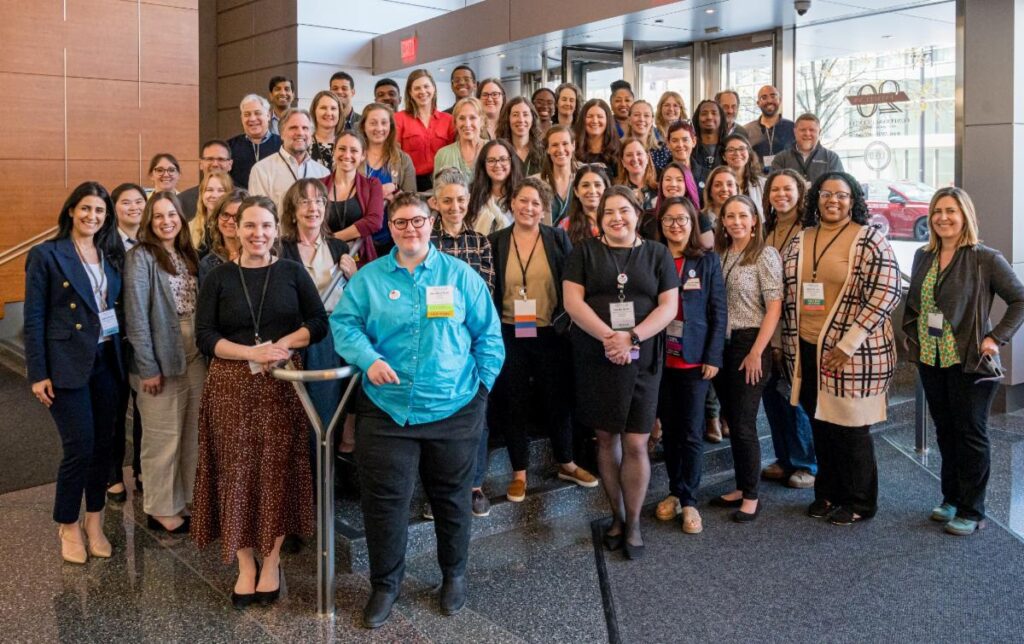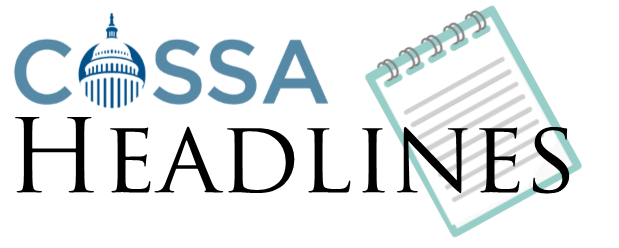Issue 8 (April 16)
Social and Behavioral Scientists Take to Capitol Hill for COSSA’s Annual Social Science Advocacy Day
On April 8-9, COSSA held its 10th annual Social Science Advocacy Day events in Washington, DC. Over 60 social and behavioral science researchers, students, and advocates from 18 different states headed to Capitol Hill to meet with more than 60 offices in the House of Representatives and Senate, all carrying a message about the need to prioritize funding for social and behavioral science research.
COSSA is especially grateful to the sponsors of this year’s event. Thank you to all involved for making this such an impactful experience!
NEW ACTION ALERTS: Urge Congress to Prioritize Funding Social and Behavioral Science Research in FY 2025!
Congressional appropriators are preparing legislation that will determine funding for federal science and statistical agencies for the next year. With strict discretionary budget caps currently in place (learn more), it is essential that we fight for the prioritization of social and behavioral science research funding in fiscal year (FY) 2025. Now is the time to write to your Members of Congress to urge their support for research funding in FY 2025!
COSSA has created a menu of resources for you to use in your outreach to lawmakers. Visit our ACTION CENTER page to send a letter to your Senators and Representative and tell them why it is critical that they prioritize funding in FY 2025 for the National Science Foundation, National Institutes of Health, Institute of Education Sciences, National Institute of Justice, Bureau of Justice Statistics, International Education and Foreign Language Programs, and the federal statistical system.
REGISTER NOW: Headlines Webinars continue April 23
COSSA’s 2024 Headlines Webinar series will continue to feature discussions with leaders of federal science agencies, providing opportunities for the social and behavioral science community to learn about agency research programs, funding opportunities, and priorities.
Upcoming Webinars:
- April 23 will feature a discussion with Dr. Jane M. Simoni about the behavioral and social science priorities at the National Institutes of Health. RSVP here.
- May 22 will feature a discussion with the Director of the U.S. Census Bureau, Robert. L. Santos. RSVP link and more details to come.
Did you miss March’s webinar? You can watch the recording now to catch up on our discussion about the research and education programs and priorities of the STEM Education Directorate at the National Science Foundation with Dr. James L. Moore III.
Headlines is a webinar series available to COSSA member organizations.
Congress Begins FY 2025 Budget Process with newly elected House Appropriations Full Committee Chair, Rep. Tom Cole
With the fiscal year (FY) 2024 budget finalized (previously reported by COSSA), Congress is looking ahead to FY 2025. The process has begun for FY 2025 with the Presidential Budget Request (see COSSA’s in-depth analysis), which had a delayed release of March 11. The Appropriations subcommittees in both chambers have also begun scheduling oversight budget hearings with the heads of Federal Agencies in preparation of drafting their respective bills for the FY 2025 budget. As a reminder, the fiscal year for 2025 will begin October 1, 2024, requiring Congress to have finalized the budget by this date unless a continuing resolution (CR) is enacted to push the deadline.
As previously reported, Representative Kay Granger (R-TX) requested a new Chair for the House Appropriations Committee as she looks forward to retirement later this year. As expected, Representative Tom Cole (R-OK) has been appointed to the role after running unopposed in the election on April 9. Rep. Cole previously headed the Transportation, Housing and Urban Development, and Related Agencies Subcommittee, a position that went to Representative Steve Womack (R-AR) on April 12. Both the Labor, Health and Human Services, Education, and Related Agencies Subcommittee and Commerce, Justice, Science, and Related Agencies Subcommittee remain unchanged in their leadership. The budget process is intended to continue as expected, with Chair Cole anticipated to release the subcommittee allocations in the upcoming weeks.
Stay tuned to COSSA’s continued coverage of the FY 2025 budget process.
OSTP Seeks Input for Safe STEM Environments
The White House Office of Science and Technology Policy (OSTP) is inviting feedback to help the Interagency Working Group on Safe and Inclusive STEM Environments (IWG-SISE) develop policies aimed at reducing sex-based and sexual harassment in federally funded STEM research. This initiative, in response to the CHIPS and Science Act of 2022 (see previous COSSA coverage), focuses on improving safety for principal investigators, research staff, and students.
The OSTP and IWG-SISE are looking for contributions from students, postdoctoral fellows, faculty, researchers, and administrators—anyone impacted by harassment in STEM spaces. The aim is to inform guidelines that address and mitigate harassment issues effectively.
To share insights or request a virtual meeting with OSTP and IWG-SISE, please contact STEM@ostp.eop.gov.
Analyzing the Cost of Open Access for Federally Funded Research
The White House Office of Science and Technology Policy (OSTP) is facing demands from Congress to provide a detailed cost estimate for its open access plan for federally funded research. Initiated by OSTP in August 2022, the plan requires that research funded by science agencies be freely accessible to the public upon publication. It mandates OSTP to complete a thorough financial analysis by June. Failure to meet this deadline will require OSTP to delay its plans until the report is submitted to Congress.
OSTP has already explored the financial aspects of open access in two reports. The first report, released in 2022, estimated annual costs to be between $390 million and $789 million. A follow-up report in 2023 focused on article processing charges (APCs), necessary fees for publishing in open access journals, showing an increase from $272 million in 2016 to $379 million in 2021.
With these financial considerations in mind, federal agencies funding research are tasked with creating open access plans by the end of this year and implementing them by the end of 2025. While the transition to open access is underway in many agencies, OSTP’s directive displays a significant change in publication practices, moving from a subscription-based to an author-pay model. This has led to concerns about potential disadvantages for researchers from institutions with fewer resources and about restrictions on researchers’ choice of publication outlets.
Some legislators have voiced worries that the shift to a model where authors pay could unfairly impact those from less wealthy backgrounds and limit researchers’ control over where and how their work is published. In contrast, OSTP argues that research funded by taxpayers should be readily accessible to them, underlining the public interest in free access to scientific findings.
As OSTP works to meet the congressional demand for a financial analysis, the discussion on the open access policy highlights ongoing considerations about the future of academic publishing, fair knowledge distribution, and maintaining a balance between accessibility and research integrity in the sharing of federally funded research.
Stay tuned to COSSA’s continued coverage on open access.
SBE Releases Dear Colleague Letter Encouraging EPSCoR Submissions
The Directorate for Social, Behavioral, and Economic Sciences (SBE) housed within the National Science Foundation (NSF) has released a Dear Colleague Letter encouraging submissions to already established NSF funding opportunities from the Established Program to Stimulate Competitive Research (EPSCoR). EPSCoR was developed to target specific areas in the U.S. with increased opportunity to study and join the science, technology, engineering, and mathematics (STEM) workforce to improve geographic and institutional diversity. As directed by the CHIPS and Science Act of 2022, NSF is in the process of dedicating more funding towards the EPSCoR jurisdictions. The letter reaffirms SBE’s commitment to support research in the social and behavioral sciences to “build on and enhance the human, social, cultural, institutional, educational, technological, geographic, demographic, and economic assets of EPSCoR jurisdictions.”
Any questions about the Dear Colleague Letter or submitting proposals from an EPSCoR jurisdiction should be directed to: nsfsbe-epscorinquiry@nsf.gov.
Upcoming AAPSS Webinar: “Media Policy for an Informed Citizenry”
On April 17, The American Academy of Political & Social Science (AAPSS) will be hosting an open webinar titled “Media Policy for an Informed Citizenry: Revisiting the Information Needs of Communities for Democracy in Crisis”. AAPSS is a COSSA member institution.
The topic of this webinar is based on the May 2023 edition of The Annals, a scholarly periodical produced by AAPSS. The webinar will discuss how people obtain news and information and how changes in technology have influenced the availability and reliability of such information. The webinar will be moderated by Molly Laas of the Social Science Research Council and will feature experts from Michigan State University, San Diego State University, University of Maryland, and University of Chicago as panelists.
Attendees can register here to receive the link for the virtual webinar.




